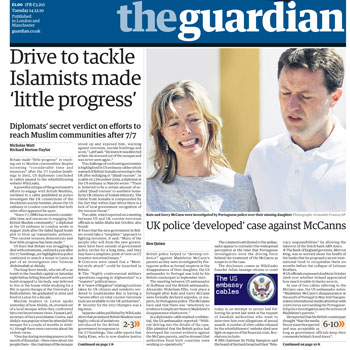|
British ambassador's reported comments to US counterpart offer insight
into role of UK police in 2007 investigation
British police helped to "develop evidence" against
Madeleine
McCann's
parents as they were investigated by Portuguese
police as formal suspects in the disappearance of their daughter, the US
ambassador to Portugal was told by his British counterpart in September
2007.
The meeting between US ambassador Al Hoffman and the British ambassador,
Alexander Wykeham Ellis, took place a fortnight after
Kate and
Gerry McCann
were formally declared arguidos, or
suspects, by Portuguese police. The McCanns have said that there was
"absolutely no evidence to implicate them in Madeleine's disappearance
whatsoever."
In a diplomatic cable marked confidential, the US ambassador reported:
"Without delving into the details of the case, Ellis admitted that the
British police had developed the current evidence against the McCann
parents, and he stressed that authorities from both countries were
working co-operatively."
The comments attributed to the ambassador appear to contradict the
widespread perception at the time that Portuguese investigators were the
driving force behind the treatment of the McCanns as suspects in the
case.
The disclosure comes as WikiLeaks founder Julian Assange returns to
court in an attempt to secure bail following his arrest last week at the
request of Swedish authorities who want to interview him over
allegations of sexual assault. A number of other cables released by the
whistleblowers' website shed new light on aspects of the financial
crisis. Revelations include:
• RBS chairman Sir Philip Hampton said the board of the bank breached
their "fiduciary responsibilities" by allowing the takeover of the Dutch
bank ABN Amro.
• The Bank of England governor, Mervyn King, was so worried about the
health of the banks that he proposed a secret international fund to
recapitalise them six months before the collapse of Lehman Brothers.
• US officials expressed doubts in October 2008 over whether Ireland
appreciated how much trouble its banks were in.
In one of two cables referring to the McCann case, the US ambassador
notes: "Madeleine McCann's disappearance in the south of Portugal in May
2007 has generated international media attention with controversy
surrounding the Portuguese-led police investigation and the actions of
Madeleine's parents."
He reported that his British counterpart thought "that the media frenzy
was to be expected and was acceptable as long as government officials
keep their comments behind closed doors".
It was not until 21 July 2008 that the Portuguese authorities shelved
their investigation and lifted the arguido status of the
McCanns. Responding to the contents of the cable, a spokesman for the
McCanns told the Guardian: "This is an entirely historic note that is
more than three years old. Subsequently, Kate and Gerry had their
arguido status lifted, with the Portuguese authorities making it
perfectly clear that there was absolutely no evidence to implicate them
in Madeleine's disappearance whatsoever.
"To this day, they continue to work tirelessly on the search for their
daughter, co-operating when appropriate with both the Portuguese and
British authorities."
British authorities had substantial involvement in the investigation
launched after Madeleine disappeared in May 2007 from the holiday
apartment where the McCanns had left their three children in bed before
joining friends at a nearby restaurant in the Algarve village of
Praia da Luz.
At least one British sniffer dog was used in the investigation and,
according to reports, was said to have picked up the scent of a dead
body in the apartment.
In 2008, when a dossier detailing investigations by Portuguese police
was made public, it emerged British scientists had warned that DNA tests
on a sample from the McCanns' holiday
hire car were inconclusive days before
they were made suspects. It is known that the Forensic Science Service
analysed material sent to Britain by Portuguese police. A spokesman for
Leicestershire police said their involvement in the investigation was
limited to co-ordinating UK-based inquiries on behalf of the Portuguese
authorities |


